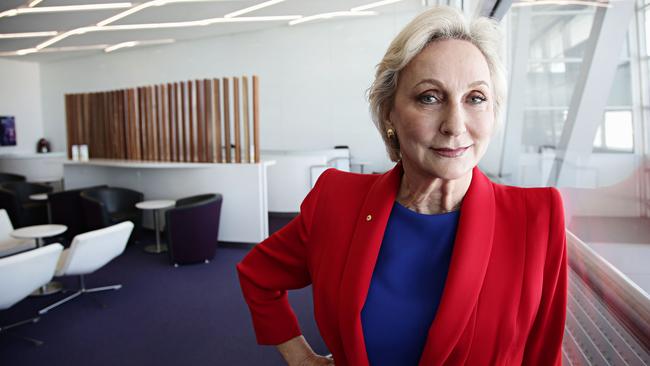Elizabeth Bryan lays down law on Virgin Australia board
When headhunted last year about taking the chairwomanship of Virgin Australia, Elizabeth Bryan was taken aback.

When headhunter Russell Reynolds approached Elizabeth Bryan last year about taking the chairwomanship of Virgin Australia, she was momentarily taken aback.
“I said to them: ‘I don’t know anything about the airline industry.’ I said, ‘Go find someone that does’,” she tells The Weekend Australian, before adding with a wide smile: “It wasn’t until they talked to me about what it was in my experience that they valued that I could then see the last thing they needed around that board table was someone who knew about the airline industry.”
Virgin Australia is an unusual beast. Over the past few years, Air New Zealand, Etihad, Singapore Airlines and Richard Branson's Virgin Group have emerged with a combined 80 per cent holding in the airline.
Each has had their chief executives serve on the board, although only one remains: Air NZ boss Christopher Luxon.
But suggest to Bryan that Virgin is unique, and through her deep, dark eyeshadow, she fixes you with her trademark glare.
It is the one the Coles Myer board remembers from the mid-1990s when at NSW State Super Bryan teamed up with AMP and Bankers Trust to challenge the retailer’s board composition. So too does global oil giant Chevron, long the major shareholder in Caltex, remember. As the former chairwoman of the oil refiner, Bryan proudly notes that “every now and then we had to put up our hand and say to Chevron, ‘Ahem, I don’t think we will do it that way, this is an Australian listed public company’.”
In her first wide-ranging interview since taking the Virgin chair last year, her message to the airline’s powerhouse shareholders — whom she met with individually before her appointment — is loud and clear. “They chose to run their investment in this country through a public company format. And how you run a public company in Australia is quite clear. The rules are clear. They are not obscure. It is not like finding your way through a swamp,” she declares.
“If you sit on the board of Virgin Australia, you are there as a director of Virgin Australia and you are working in the best interests of the company. And if you have an inherent conflict of interest that you can’t come and do that, then you have an issue.”
Bryan’s slightly regal nature and appearance is in stark contrast to her roots, which lie on her family’s cattle and sheep on properties near Coonabarabran in northern NSW.
Her rural upbringing explains her frankness and tireless work ethic, which has been tested like never before over the past decade as she has nursed her elderly parents and her sick husband, all of whom have now passed away.
“It is hard work, it is sad. But it is also a great privilege to look after someone, to be there through that whole process. You do what you can do and you manage what you can’t do,” she says, slowly.
And while those who know Bryan say there is nothing regal about the way she conducts herself as a chairwoman — she is said to be warm, gracious, respectful and across the detail — she boasts something of the iron fist of royalty. If dressed in a velvet glove.
Be in no doubt, you underestimate Elizabeth Bryan at your peril. Asked if her message on governance has got through to Virgin’s directors since she took up the chairwomanship last May, her response is vintage Bryan.
“I have had no indication around the board table that they don’t understand,” she replies, before adding with a grin: “There is no reason that they should not understand it. And I am very able to remind anyone who has a memory lapse of just how things need to be done.”
It is a very different style to the one that marked the chairmanship of her predecessor Neil Chatfield, who apparently preferred to let Virgin chief executive John Borghetti deal with the delicate issue of managing his shareholders.
When Chatfield was in the top job, Singapore Airlines chief executive Goh Choon Phong, Etihad boss James Hogan and Virgin Group CEO Josh Bayliss were all on the board, in addition to Luxon. It was a formidable line-up.
Bryan says she has some sympathy for the only one that remains. “It is a harder issue if you are a CEO,” she says, noting that directors that represent corporate shareholders on boards rarely run their company.
“They can go back and speak to their CEO, board and shareholders. They can have differing views. But if that is all embroiled in the one person ... maybe someone who is extremely clever and extremely experienced may be able to sort it out. But I say to people in that situation, ‘tough job’.”
In the past, Luxon, Branson and Hogan have spoken publicly about Virgin’s strategy, although the Hogan has said nothing for almost two years. And while Bryan values immensely the operational expertise the airline shareholders bring to the board table, it seems she will not countenance loose-lipped directors in the future.
“Usually the way public companies work here, the CEO is the major public spokesman for the company. And then the chairman if it becomes a board matter. By and large, you won’t see directors coming out and being spokesmen for the boards they sit on unless there are special circumstances and the chairman has asked them to,” she says.
Chatfield put in place protocols that restrict the flow of some information between Virgin Australia and the representatives of its airline shareholders.
The directors are not given information about Virgin’s alliance agreements, its international business or any other matter that could create a conflict of interest. They receive aggregated financial data.
While Bryan says “the process so far is fine” and notes she has been in the chair for only a short time, she hints that the protocols could change.
“Whether they can be redefined in a way that still allows them to serve those purposes and loosens things up a bit ... Having more knowledge that can be shared with shareholder representatives,” she says.
“People always like more information. The moment you tell someone they can’t know something, they immediately feel they need to know it.”
With her background in the investment community, Bryan also brings a unique perspective to her chairwomenships, which she says gives her empathy for the position of shareholders, whether they be retail, institutional or corporate.
“It is very useful that I have sat on both sides of the fence. It helps me as a director. I am aware of shareholders — the decisions they have to make, their concerns and how important transparency is to them,” she says.
The small Virgin free float has led to ongoing speculation that the shareholders might look to take the company private. There is no sense such a prospect is imminent, but Bryan is firm in saying it is their call. “It is the shareholders’ call, not the board’s call. If the shareholders want to take a public company private, it is the board’s role to ensure all shareholders are treated fairly and equally.”
Yet Bryan doesn’t hide her frustration with the lack of Virgin stock in the hands of those outside the aviation industry. The small free float has meant the Virgin share price since Borghetti took over almost six years ago has been stuck in a narrow trading range.
The Qantas share price, by contrast, has soared.
“You wonder what the share price is telling you when you have an illiquid stock. What does it mean? A share price that reflects the value of the company is a good thing and that is what you get with a liquid, traded stock.
“You don’t have the influence of the major institutional investors in our stock who are the influence in most liquid stocks.”
Transformation has been a theme of Bryan’s career. As NSW State Super’s investment manager and then it’s CEO, she orchestrated a turnaround in the group’s culture and performance.
She did the same in the chairwoman’s role at Caltex. She also served as the CEO of Deutsche Asset Management and led the private equity business of the Australian Industry Development Corporation.
Now, in addition to Virgin she is preparing to take on the chairwomanship of insurer IAG at the end of the month, and is likely to exit the board of Westpac after a decade of service.
She has a great appreciation for the work Borghetti has done at Virgin, which has taken the former leisure carrier upmarket and given it more than 20 per cent of the Australian corporate travel market. “Virgin has taken a low-cost industry structure and come into an industry as the challenger company. And it has really established itself, and changed a lot of the characteristics of the airline industry in Australia in a positive way.”
Not that she doesn’t have admiration for its fierce rival. Despite being Virgin chairwoman, she remains a member of Qantas’s exclusive chairman’s lounge.
“Qantas is a wonderful symbol of Australia and is a great part of our airline industry and our economic development story. It is a great brand,” she says.
“What Virgin does doesn’t detract from the terrific Qantas story. But Virgin has come in and said, ‘This market is big enough for two airlines, not one. And there are things that can be done to reshape and improve the industry.’ And it has done it.
“All credit to Qantas on what they have done over the past two years, they have changed their company. But some of that has possibly come from the change that has come from Virgin.”
She says she makes herself available to Borghetti and his team “24/7 to justify my pay package”, and in the early months of her chairwomanship has been making a special effort to visit the company’s offices and operations on a weekly basis.
Bryan describes Borghetti as “a man with a lot of coverage as a builder … He is quite a visionary. A very nice man, a very easy man to work with. He is open and straightforward in his dealings and works very hard.
“He is very proud of and loyal to his staff. He is a good guy.”
Borghetti in turn describes Bryan as an “outstanding” chairwoman. “As a business, we are lucky to have her and she has already added immense value,” he says. “She is skilled in leading the board, managing diverse interests and maintaining excellent standards of corporate governance.”
Bryan admits she still has plenty to learn about the airline industry — even if the Virgin board hired her for the fact she knew nothing. And she says those who assert the Australian aviation sector has now returned to a cozy duopoly with lower fuel prices and the end of a brutal capacity war are badly mistaken.
“It is an intensely competitive industry. Route by route, it is intensely competitive,” she says.
“I haven’t felt cozy in the airline industry anywhere yet. For that, you can only live and hope.”




To join the conversation, please log in. Don't have an account? Register
Join the conversation, you are commenting as Logout